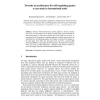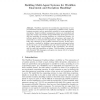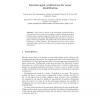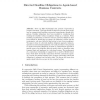ATAL
2009
Springer
14 years 23 days ago
2009
Springer
This paper puts forward a normative framework for computational societies which enables the handling of incomplete knowledge about normative relations. In particular, attempts to p...
ATAL
2009
Springer
14 years 23 days ago
2009
Springer
Abstract--Norm-enforcement models applied in human societies may serve as an inspiration for the design of multi-agent systems. Models for norm-enforcement in multi-agent systems o...
ATAL
2009
Springer
14 years 23 days ago
2009
Springer
ATAL
2009
Springer
14 years 23 days ago
2009
Springer
Abstract. Workflows represent the coordination requirements of various distributed operations in an organisation; workflows neatly capture business processes, and are particularly ...
ATAL
2009
Springer
14 years 23 days ago
2009
Springer
Multi-agent systems (MASs), comprised of autonomous entities with the aim to cooperate to reach a common goal, may be viewed as computational models of distributed complex systems ...
ATAL
2009
Springer
14 years 23 days ago
2009
Springer
Most works on norms in the multi-agent systems field have concentrated on how norms can be applied to regulate behaviour in agent societies using a top-down approach. In this work,...
ATAL
2009
Springer
14 years 23 days ago
2009
Springer
In this paper we present the results of our user study about status message sharing on the Social Web. The study revealed the privacy and information noise (sometimes originating f...
ATAL
2009
Springer
14 years 23 days ago
2009
Springer
MAGE (Multi-Agent Game Environment) is a logic-based framework that uses games as a metaphor for representing complex agent activities within an artificial society. More specifical...
ATAL
2009
Springer
14 years 23 days ago
2009
Springer
There are B2B relationships that presume cooperation in contract enactment. This issue should be taken into account when modeling, for computational handling, contractual commitmen...
ATAL
2009
Springer
14 years 23 days ago
2009
Springer
In this paper we present a new model for the requirements analysis of a system. We offer a conceptual model defined following a visual modeling language, called dependence networks...




